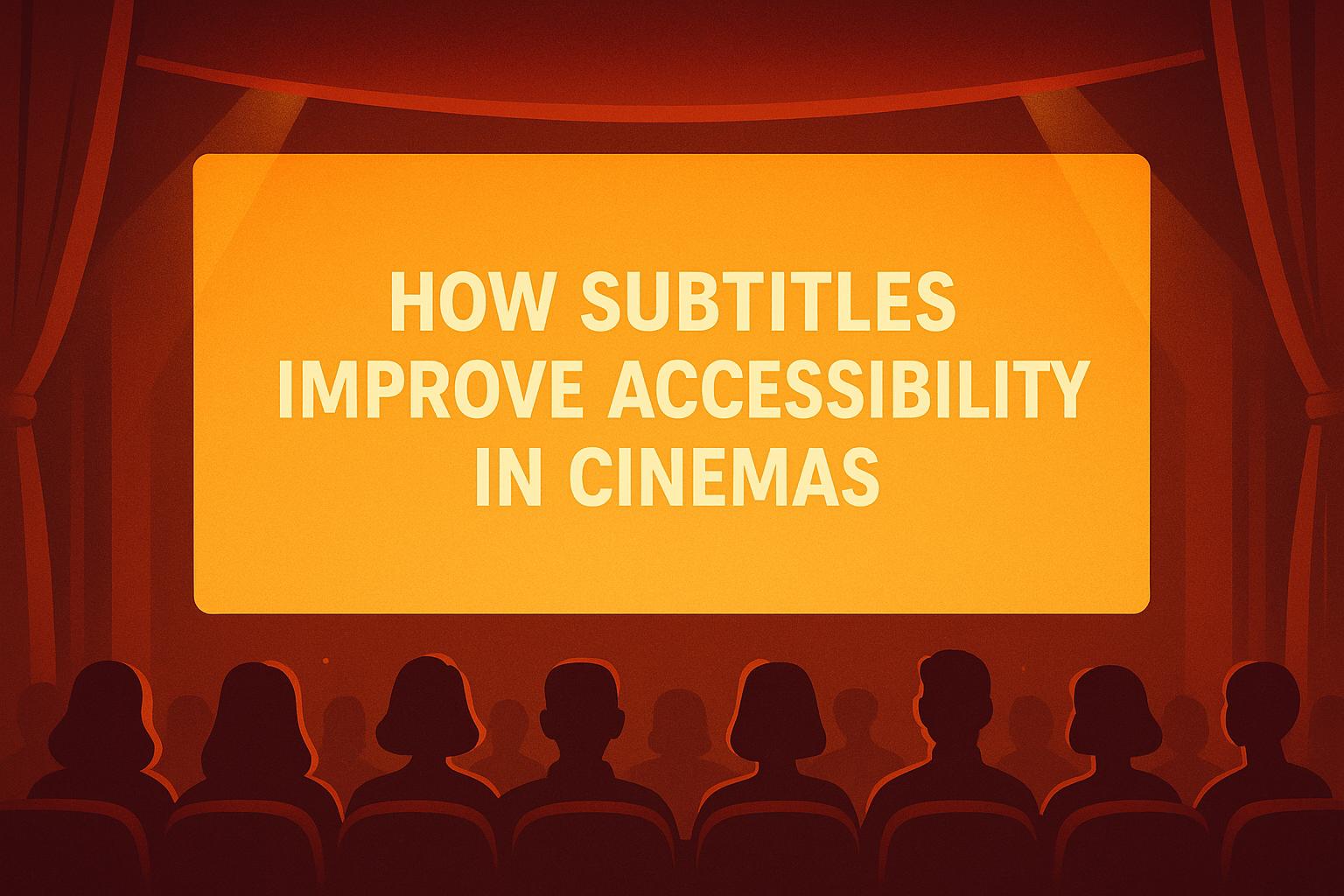SEO helps cinemas sell more tickets by improving their online visibility and reaching moviegoers actively searching for showtimes or local theaters. Here's how:
- Organic Traffic: Over 53% of website traffic comes from search engines, making SEO a key driver for attracting visitors.
- Mobile Optimization: With 63% of Google searches on mobile, a fast, user-friendly mobile site is critical.
- Local SEO: Appearing in searches like "movie theaters near me" connects cinemas with nearby audiences.
- Structured Data: Adding showtimes and movie details directly in search results simplifies the customer journey.
- Updated Content: Accurate movie listings, engaging blogs, and videos keep users engaged and improve rankings.
- Reviews: Local reviews build trust and improve search performance.
Basic SEO Principles for Cinema Websites
What is SEO and Why Cinemas Need It
Search Engine Optimization (SEO) is all about improving your website’s visibility for searches related to movies, showtimes, and local theaters. For cinemas, this means showing up when someone searches for terms like "movie theaters near me" or specific film titles.
To stand out online, cinemas need to focus on several key strategies: optimizing keywords, ensuring fast and secure pages that work well on mobile (technical SEO), providing accurate and updated content, using structured data for rich search results, and maintaining clear internal links.
- Keyword optimization ensures your content matches the words people actually use when searching. Think movie titles, showtime-related phrases, and local terms.
- Quality content is essential. Keep showtimes updated, write engaging movie descriptions, and make sure all details are accurate. Search engines reward websites that provide fresh, useful information.
- Structured data and Schema markup are tools that help search engines understand your site better. By marking up details like showtimes and locations, you can enable rich search results where movie times appear directly in search.
- Internal linking connects pages on your site, making it easier for both visitors and search engines to navigate.
Local SEO: Reaching Nearby Moviegoers
Local SEO is a game-changer for cinemas, as most moviegoers search for theaters within a short distance. In fact, 88% of consumers who search for a local business on their phone either call or visit that business within 24 hours.
To capture this audience, focus on geographic keywords. Instead of just targeting "movie theater", use phrases like "movie theater in Boston" or "cinema near downtown Denver." These location-specific terms make it easier to connect with people looking for entertainment in your area.
Consistency is key for NAP (Name, Address, Phone number) details. Ensure your information matches across your website, social media, and third-party platforms to rank better in local searches.
Google My Business is another critical tool. This acts as your theater’s digital storefront, displaying details like your address, hours, photos, and reviews directly in search results. Claim your listing, verify it, and keep it updated with high-quality images, current showtimes, and any special events.
Lastly, creating locally relevant content can strengthen your connection with nearby audiences. Share updates about local film festivals, collaborations with nearby businesses, or special screenings. This not only builds community ties but also signals to search engines that your theater is active and relevant to the neighborhood.
With these elements in place, the next step is ensuring your mobile experience is seamless.
Mobile Optimization: Creating Better User Experience
Mobile optimization is essential for converting searches into ticket sales. Most people use their phones to check showtimes, read reviews, and buy tickets while on the go. Your website needs to perform flawlessly on mobile devices.
Focus on responsive design, fast-loading pages, and intuitive navigation to make mobile visits smooth and effective. Movie posters should display clearly, showtime grids must be easy to read, and ticket purchasing buttons should be large enough to tap without frustration. The goal is to make the journey from browsing to buying as quick and simple as possible.
A great example of this in action is Filmgrail's solutions, which enhance mobile experiences with features like auto-playing trailers, video stories, and personalized push notifications. These tools engage users while making it easy to act - whether it’s buying tickets or adding movies to a watchlist. Filmgrail also integrates local reviews, which can help build trust and drive conversions.
The checkout process is particularly important. Filmgrail ensures this step is seamless, reducing friction and making it easy for customers to complete their purchases. A smooth mobile experience not only improves user satisfaction but also boosts conversion rates, turning your SEO efforts into actual sales.
SEO Strategies That Drive Ticket Sales
Optimizing Showtimes and Ticketing Pages
Your showtime and ticketing pages are the heart of your website, where visitors turn into paying customers. Getting these pages right is essential for both search engine rankings and sales.
Start by keeping showtimes updated across all platforms. Accurate, up-to-date details attract both search engines and moviegoers. Include specifics like theater numbers, runtime, and ticket prices in U.S. dollars (e.g., $12.50 for adults, $9.75 for seniors). Transparency like this not only builds trust but also helps search engines better understand your content.
Use structured data markup on each movie's dedicated page. This step ensures that search engines can display showtimes directly in search results, making it easier for potential customers to find your listings and boosting your chances of ranking for specific film-related searches.
Also, make sure your ticketing process is fast and mobile-friendly. A streamlined checkout process, like the one Filmgrail offers, reduces friction for users and improves conversion rates. Plus, a smooth mobile experience signals to search engines that your site delivers value, which can positively impact rankings.
Next, let’s dive into how to create content that keeps moviegoers coming back.
Creating Content That Attracts Moviegoers
Engaging content - whether it’s blogs, videos, or interviews - can entertain, inform, and draw in movie enthusiasts while naturally incorporating the keywords they’re searching for.
Consider creating blog posts and videos tailored to your audience. For example, director interviews, sneak peeks, or behind-the-scenes footage can capture long-tail keywords and deepen audience engagement. Highlight upcoming releases, unique insights, and even local film trends to keep your content relevant and interesting.
Videos are a must-have for film marketing websites. High-quality visuals, like auto-playing trailers or video stories, grab attention and keep visitors on your site longer. Features like those offered by Filmgrail create immersive experiences that not only engage users but also provide search engines with rich media to index, which can help drive sales.
Encourage user-generated content to build a sense of community. Ask moviegoers to share photos, reviews, or social media posts about their experiences. Featuring this content on your website and social channels can increase engagement and create a loyal audience.
These strategies naturally lead us to the importance of local reviews in your SEO efforts.
Getting Reviews from Local Audiences
Local reviews are a goldmine for both SEO and conversions. They provide fresh, keyword-rich content while also building trust with potential customers. Reviews from people in your community carry extra weight because they reflect authentic, local experiences.
Filmgrail’s approach to local reviews focuses on gathering feedback from theater visitors in the same city. These reviews often include specific details - like parking convenience, seating comfort, or concession stand quality - that not only help with local SEO but also address common questions or concerns potential customers may have.
Make it easy for customers to leave reviews by setting up automated follow-ups or dedicated sections on your website. Responding quickly to reviews shows that you value feedback, which strengthens community trust.
Display standout reviews prominently on your site and in marketing materials. When potential customers see glowing reviews from their neighbors, they’re more likely to choose your theater over competitors. This kind of social proof complements your SEO efforts and helps turn website visitors into paying customers.
Finally, keep an eye on review trends. If certain aspects of your theater get frequent praise, weave those keywords into your website content. On the flip side, if recurring complaints pop up, address them operationally and update your site to reflect those improvements. This proactive approach can enhance both your online reputation and your ticket sales.
Measuring SEO Success and Making Improvements
Key Metrics to Track
Tracking meaningful metrics is essential to determine if your SEO efforts are translating into ticket sales. It's not about chasing vanity numbers but focusing on data that impacts revenue.
Website traffic and source analysis is a great starting point. This data shows how visitors are finding your site - whether it's through organic search, paid ads, social media, or direct visits. Specifically, pay attention to local search traffic from people looking for "movie theaters near me" or "showtimes in [your city]." These users are typically ready to buy tickets.
Showtime page visits and engagement provide insight into how well your content resonates with potential customers. Look at which movie pages get the most views, how long users stay on ticketing pages, and where they drop off in the buying process. If visitors spend less than 30 seconds on these pages, it might indicate your content isn’t meeting their expectations.
Local search rankings for terms like "movie theater [your city]" or "[movie title] showtimes" heavily influence visibility. Monitor your position for these keywords monthly. Even small improvements, like moving from position 4 to position 2, can lead to noticeable increases in click-through rates and ticket sales.
Finally, track ticket purchase conversions from organic traffic. This is the ultimate measure of success. Calculate the percentage of visitors from search engines who complete a purchase and monitor how this improves as you refine your SEO strategy.
Regular Content Updates and SEO Improvements
Search engines reward websites that provide timely, relevant updates. For cinemas, this means keeping your content fresh and aligned with current trends.
Update movie listings promptly whenever new films arrive or showtimes change. Seasonal content - like summer blockbusters, Halloween thrillers, or holiday promotions - should also be part of your strategy. Search engines frequently crawl cinema websites, and outdated information can hurt your rankings. Accurate, up-to-date content not only improves your visibility but also drives ticket sales.
Blog posts and event pages need attention too. Archive older posts about past events, but refresh evergreen content like "Best Date Night Movies" or "Family Movie Guide" with current recommendations. This ensures your content stays relevant while retaining its SEO value.
To adapt to changing search habits, optimize for voice search. Update FAQ sections with conversational questions like "What movies are playing tonight?" or "How much are tickets?" Voice queries are becoming more common, and addressing them can help you capture this growing audience.
Using Analytics Tools for Better Decisions
Data takes the guesswork out of SEO. With the right tools, you can pinpoint what’s working, what isn’t, and where to focus your efforts to boost ticket sales.
Google Analytics 4 is a must-have for understanding user behavior on your site. Track ticket purchase conversions and create custom reports to identify high-performing search terms and pages. The "Acquisition" reports are particularly useful for seeing which SEO strategies bring in valuable traffic.
Google Search Console provides a clear picture of how your site performs in search results. Use it to monitor the queries driving traffic, your average ranking for key terms, and any technical issues affecting your SEO. The "Performance" tab is especially helpful for spotting opportunities - if you’re ranking on page 2 for "family movies [your city]", targeted optimization could push you to page 1.
Local SEO tracking tools are vital for monitoring your presence in map searches and local business listings. Track metrics like Google Business Profile views, direction requests, and phone calls from search results. These often correlate directly with ticket sales and foot traffic.
For a more cinema-specific approach, Filmgrail's analytics platform connects website performance directly to ticket sales. It tracks how SEO-driven traffic converts into purchases and repeat visits, giving you a clear picture of your return on investment. This level of insight helps you understand which pages and strategies are driving revenue.
Set up automated reports to monitor your key metrics weekly or monthly. Look for patterns - does certain content consistently lead to more ticket sales? Are there seasonal spikes in organic traffic? Use these insights to fine-tune your content and SEO strategies.
Additionally, A/B testing can help you optimize both for search engines and user engagement. Experiment with different title tags, meta descriptions, and page layouts to see what drives more clicks and conversions. These adjustments feed directly into your overall SEO strategy, helping you refine your approach over time.
sbb-itb-b1b0647
Movie theaters eye new tactics to improve ticket sales
Conclusion: SEO as a Key Driver for Cinema Success
SEO isn't just about online visibility; it's about transforming that visibility into tangible results - like ticket sales. By optimizing cinema websites for local searches, mobile users, and relevant movie content, theaters can create a solid strategy that consistently boosts revenue.
The tactics we've explored work together to build a well-rounded marketing approach. For instance, content like local movie reviews or engaging blog posts keeps visitors returning to your site, building trust and loyalty. This isn't just about attracting clicks - it's about creating a connection with your audience.
A smooth mobile experience plays a crucial role in turning searches into actual sales. Local reviews add credibility and influence decisions, effectively tying your SEO efforts to higher conversion rates. It's all about aligning your strategy to meet moviegoers where they are.
Tracking metrics such as local search rankings and ticket conversions ensures your efforts stay on target. Regularly updating content and refining technical aspects of your site keeps you competitive in search results. These steps work together, reinforcing the power of SEO in driving cinema success.
Companies like Filmgrail take this a step further by blending SEO-friendly web design with features that engage users. Auto-playing trailers, video stories, and personalized push notifications keep audiences hooked, while integrated analytics clearly show how SEO improvements translate into ticket sales. This makes it easier to see the value in your marketing investment.
For cinemas, SEO offers a sustainable way to grow audiences and revenue. Unlike paid ads, it provides long-term traffic and sales benefits. When done right, SEO becomes more than just another marketing tool - it evolves into a dependable system for connecting with moviegoers and driving consistent ticket sales.
FAQs
How can cinemas use local SEO to attract nearby audiences and boost ticket sales?
Cinemas looking to connect with their local audience can benefit greatly from local SEO strategies. Start by optimizing your website with location-specific keywords - this could include your city or even neighborhood names. Also, make sure your Name, Address, and Phone number (NAP) is accurate and consistent across all platforms, from directory listings to social media profiles. This consistency helps search engines and potential customers find you easily.
Another effective approach is creating localized content. For example, write blog posts about community events, local partnerships, or anything that resonates with nearby moviegoers. Don’t forget to set up and optimize your Google Business Profile - it’s a powerful tool for boosting local visibility. Lastly, encourage happy customers to leave glowing reviews online. Positive feedback not only builds trust but can also drive more ticket sales, both online and at the box office.
How can cinemas optimize their websites for mobile users to improve the ticket-buying experience?
To make buying tickets easier for mobile users, cinemas should prioritize a mobile-friendly website. Start by using responsive design, so the site adjusts effortlessly to fit any screen size. Speed is crucial too - compress images and streamline code to ensure pages load quickly.
Keep navigation simple with clear menus and eye-catching buttons like "Buy Tickets" or "Reserve Seats". Adding features such as click-to-call and quick access to digital tickets can simplify the process even more. It's also important to regularly test the website on various devices to ensure it performs well across the board. These updates not only improve the ticket-buying experience but also encourage more sales and happier customers.
Why should cinemas regularly update their website content, and how does it help improve SEO and ticket sales?
Keeping your cinema's website content fresh and regularly updated plays a big role in improving SEO performance and boosting ticket sales. Search engines favor websites that consistently offer relevant and current information, which helps your cinema rank higher in search results. This increased visibility ensures local moviegoers can easily find details like showtimes, events, and promotions - leading to more clicks and, ultimately, more ticket purchases.
Frequent updates, such as posting new showtimes, promoting special events, or showcasing limited-time offers, also give visitors a reason to come back. These repeat visits not only increase engagement but also make users more likely to buy tickets. On top of that, their interactions contribute to better SEO rankings. Simply put, keeping your content up-to-date doesn’t just enhance your online presence - it directly translates to more moviegoers and higher sales.


